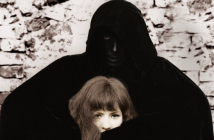A Tale of Love and Darkness (2015)
Cast: Natalie Portman, Makram Khoury, Shira Haas
Director: Natalie Portman
Genre: Drama
Editor’s Note: The following review is part of our coverage of the 2015 Cannes Film Festival. For more information please visit www.festival-cannes.com/en or follow the Cannes Film Festival on Twitter.
Natalie Portman’s directorial debut A Tale of Love and Darkness screened as a Special Screening during the Cannes Film Festival, giving her the opportunity to promote this first film at the festival outside the competition unlike her actor-turned-director fellow Ryan Gosling, whose debut feature Lost River screened in last year’s Un Certain Regard and received mixed and harsh reviews.
Portman’s Hebrew-language film A Tale of Love and Darkness is based on the autobiography of the same name by Israeli author Amos Oz. The novel, which was written in 2004, is Israel’s best-selling novel of all time and also an international best-seller. The adaptation of the novel can be described as a coming-of-age story of Amos (Amir Tessler) during the troublesome years of the birth and early years of the state of Israel. Although the film offers three different timelines and is told by Amos himself in retrospect, most of the story takes place during the late 1940s and 1950s when Amos is around the age of 10.
[The film] is more concerned with its intellectualized dialogues which is also one of the reasons why the characters seem distant and often inaccessible.
The film picks up in 1945 during the British mandate, just a few years before Israel is declared a state, followed by the war of independence. Even though the historical events are significant to the narrative, the film rather concentrates on the consequences these political outcomes have on Amos family, especially on his mother Fania (Natalie Portman), who is devastated by the developments in Israel. Her and her husband’s families were European refugees, settling in Palestine  after being persecuted during the Second World War. She has high expectations for her new life and therefore idealizes Israel and has a romantic point of view of the world in general. Ever since she was a little child, she has been dreaming about Zionism, which stands in stark contrast to her husband Arieh’s (Gilad Kahana) point of view who is a very pragmatic and rational man.
after being persecuted during the Second World War. She has high expectations for her new life and therefore idealizes Israel and has a romantic point of view of the world in general. Ever since she was a little child, she has been dreaming about Zionism, which stands in stark contrast to her husband Arieh’s (Gilad Kahana) point of view who is a very pragmatic and rational man.
Although they believe in different concepts of life, Fania and Arieh share their love for literature and language, which is why A Tale of Love and Darkness is also a story of the Hebrew language and its mythology. Amos grows up benefiting from both sides, the academic influence of his father and the zionist but also imaginative influence of his mother. Fania would tell him stories of her childhood in Poland and tales of fiction while his father would introduce him to the poetics of the Hebrew language on an educational level.
As an autobiography, A Tale of Love and Darkness naturally focuses on Amos’ experiences while growing up, including not only the political circumstances but also the immense influence of his mother on his later work as a writer and his personal beliefs. Due to the exploration of the mother-son relationship Portman’s film often seems unbalanced, unsure whether its main focus is on Amos or on Fania. Additionally to that, the foundation of the Israeli state and its historical context plays another major role within the film and causes another shift in focus.
A Tale of Love and Darkness is nevertheless a good directorial debut by Natalie Portman…
When the independence of Israel did not promise Fania the life she had hoped for, she falls into solitude and depression and starts to anticipate death, which has been one of the major themes of A Tale of Love and Darkness and a constant companion in Fania’s stories within the film, functioning as a foreshadowing element. Her death, which is already announced at the very beginning of the film, remains unemotional and suspenseless, one of the film’s biggest flaws. It is more concerned with its intellectualized dialogues which is also one of the reasons why the characters seem distant and often inaccessible.
A Tale of Love and Darkness is nevertheless a good directorial debut by Natalie Portman, especially in terms of its context and the heavy burden of adapting Israel’s best-selling and widely known novel.
A Tale of Love and Darkness is nevertheless a good directorial debut by Natalie Portman, especially in terms of its context and the heavy burden of adapting Israel's best-selling and widely known novel.



